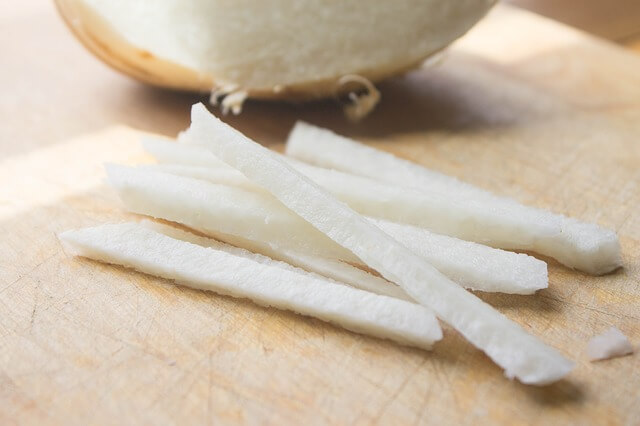Are you in quest of finding healthy diet alternatives for your pet, and after some research, you’re wondering, “Can dogs eat jicama?”
You’ll be relieved to know that this plant can be very beneficial for man’s best friend.
Keep in mind, though, while the flesh of jicama is very good for your pet, other parts of the plant (stem, skin, seeds, and leaves) are toxic for them and can be dangerous.
So, make sure you feed your dog the jicama flesh only.
Using jicama in your dog’s diet can be a nice alternative.
If your doggo is a bit tired of eating the same things, and you’re in search of something a bit unusual, especially for those who live outside of Mexico.
Also, it’s a very good snack if your pet needs to lose some weight.
So, before we even answer the questions like “how do you cook jicama”, let’s mention all of the benefits as well as potential disadvantages of jicama as dog food.
Benefits Jicama Has on Dogs

If you feed your dog to jicama flesh, you can expect a lot of good things to happen with your dog’s health.
Being a Mexican root vegetable, it’s completely understandable to not know too much about this plant and all of the advantages it has not only for dogs but also humans.
You can stop wondering can dogs eat jicama as soon as you read the following benefits it has

-
Low in calories
I’ve seen a lot of questions similar to “Is jicama good to lose weight?” and you’ll be glad to know that the answer is positive.
Mexican potato or singkama (as it’s commonly known) is very low in calories as well as fats while being rich with nutrients, which means that you can use it even if your doggo is on a diet regime.
Serving your pet this vegetable will help him/her lose weight without being constantly hungry and without missing the energy for his/her activities.
-
Rich with vitamins
Jicama is high in vitamins that improve the overall health of your dog, especially vitamins C and A.
If your doggy is having trouble with the immune system, jicama is one of the best vegetables for dogs that will keep their immune system strong and healthy.
-
High in minerals
Another advantage of this vegetable is that it’s very rich in beneficial minerals such as calcium, phosphorus, iron, and potassium.
These minerals are extremely important for your dog’s health and can significantly improve it.
-
Great source of fiber
Dogs who have problems with their stomach will benefit a lot from eating this vegetable since it has a lot of dietary fibers that improve the digestive tract of both humans and dogs.
As a matter of fact, when it comes to humans, this plant can reduce the risk of colon cancer.
Your doggo’s stomach will be healthy thanks to the moderate consumption of jicama.
-
Great source of inulin
The presence of inulin in jicama is crucial for the health of your dog’s digestive tract.
Why? Because it is a probiotic fiber that will provide your doggy with good gut bacteria and make a balance in the gut flora, which improves the overall health of your dog.
This will improve not only his/her health but also mood, and help lose those stubborn kilos if your pet is overweight.
Can Dogs Eat Jicama and How to Prepare It?

Now that the question “can dogs eat Singkamas?” is out of the way, and the answer is, of course, positive, it’s high time we talked about the best ways to prepare and serve the jicama to your pet.
While dogs can eat both raw and cooked singkama, if your pet has even the slightest stomach sensitivity, cooked and unseasoned jicama is always a better choice.
You can feed it to him/her as a snack or serve it with other food since it is very low in calories.
I prefer cutting the jicama plant into small pieces, cooking them until they become softer, and then adding them over the cooked meat or mixed with other veggies.
My dog really loves eating it, especially since the taste is a tad sweet and very appealing to pets.
Potential Risks of Feeding Dogs Jicama

As said, not all parts of this vegetable are edible when it comes to dogs.
While the flesh is completely safe and recommended, stem, skin, seeds, and leaves contain rotenone that’s very toxic for dogs.
That’s why it’s imperative to make sure your dog doesn’t consume these parts of Mexican potato, but only the flesh, in order to be safe.
Another risk is individual and can be tested very easily. As you can imagine, some dogs may have problems with eating even the flesh of jicama.
While it isn’t dangerous or toxic, it can create issues with digestion and gasses in your pet’s tummy. It’s always recommended to consult a vet before introducing new food to your dog.
Still, you can always test out if your pet will enjoy eating Mexican potatoes or not.
Before making jicama a regular addition to your dog’s diet, make sure to give him a small amount of this vegetable as a “test run” and wait for a couple of hours to see how your doggo is reacting to it.
You can try this with raw jicama. If it creates gasses in your dog’s stomach, try the same with cooked jicama and wait for the reaction.
Is your dog happy with the taste? Is he having any digestive problems? What about his mood?
Monitor your dog’s behavior not only with this vegetable but with any new food that you want to include in its diet.
FAQ about Dog’s Diet
While we’re here talking about jicama and all of its benefits on your little furry ball, let’s also answer some of the frequently asked questions when it comes to what dogs should(n’t) eat, shall we?
1. What fruits are not good for dogs?

Even though the majority of fresh, organic fruits are very healthy and good for dogs, there are some fruits that can be very toxic.
Here’s which fruits you should avoid and why:
- Avocado – Even though your doggo would need to consume a large amount of avocado to actually get sick, it’s still not recommended to take a risk and feed him/her this fruit. For humans, it’s very healthy, but for dogs, it can be toxic and cause vomiting, diarrhea, and other stomach problems. Also, the pit can be dangerous and choke your pet.
- Cherries – This fruit contains cyanide that’s highly toxic to dogs.
- Grapes – While grape seed extract is recommended and beneficial to your dog’s health, you must never feed the dog the actual grapes or other raisins because they are extremely dangerous. If you notice your dog consuming even the smallest amount, call a vet immediately.
- Tomatoes (green parts) – If your dog eats the red flesh of a ripe tomato, he/she won’t have any problems. However, green parts can cause muscle weakness, seizures, tremors, and an upset stomach.
- Citrus (lemons, grapefruit, limes, etc.) – Citrus is very strong for dogs and can cause various stomach problems, and the most frequent one is vomiting.
- Plums – Plums contain pits that are very toxic for dogs because of the cyanide. So, don’t risk feeding them this fruit as there are many other alternatives for the same vitamins.
- Mayonnaise
2. What veggies are safe for dogs?
- Mushrooms – The majority of mushrooms are very toxic and dangerous for dogs. So, if you’re unfamiliar with different species, or if you aren’t 100% sure, avoid serving them to your pet and have peace of mind without worrying whether or not the kind that you prepared was toxic.
- Onions & garlic – These vegetables will cause nausea, diarrhea, vomiting, etc. They also damage red blood cells because of disulfides and thiosulphates that are highly toxic not only for dogs but also for cats.
- Asparagus – Asparagus, in general, is best consumed raw because when it’s cooked, it loses the majority of nutrients, and it isn’t very beneficial. Having this in mind, raw asparagus is toxic for dogs and causes various problems with the stomach. Also, if the piece is too large, it can be a choking hazard, so it’s better to avoid it.
- Plantain
Read Also: Can Dogs Eat Goji Berries
Bottom Line
As you can conclude, jicama has numerous benefits that improve your dog’s overall health and the nutrients that are fantastic for its digestive tract.
That’s why, if you’re lucky and your dog likes the taste, jicama is one of the best options for snacks or side dishes with meals.
Of course, cooked jicama will be better because it won’t be heavy for your dog’s tummy.
Feel free to include this incredible vegetable not only in your dog’s but also in your diet since it’s high in fiber and has a lot of good bacteria that will regulate your gut health.
Read Next: How To Get A Dog Unstoned

